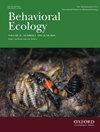探索与食肉动物的饮食选择性和回避学习方式有关
IF 2.2
3区 环境科学与生态学
Q2 BEHAVIORAL SCIENCES
引用次数: 0
摘要
根据 "慢-快综合症 "的假设,人格类型与学习风格之间存在相关性;快速探索者的学习风格更积极主动(速度快但不灵活),而慢速探索者的学习风格更被动(速度慢但灵活)。关于这种人格-认知耦合关系的经验证据仍然没有定论,而且主要偏向于鸟类。此外,大多数研究都没有考察认知任务是辨别食物质量时性格与认知的相关性,而这种情况与能量获取直接相关,是慢-快综合征进化的基础。在本研究中,我们考察了机会主义捕食者--普通日鳐Eutropis multifasciata--在回避学习中的探索-认知相关性。我们量化了个体在陌生环境中的探索倾向,并比较了蜥蜴在初始学习试验中将猎物的颜色和味道联系起来时的觅食行为,以及在随后的反向学习试验中将颜色和味道联系起来时的觅食行为。我们发现,快速探索者不那么挑剔,随着经验的积累,他们对觅食行为的改变也较少,符合更积极主动的认知风格。相比之下,慢速探索者是反应型学习者,在学习和反向学习阶段都能改变觅食行为,尽管这种能力取决于颜色-味道处理。与传统预测相反,我们的重点物种的主动-反应学习风格并不是通过学习速度-灵活性的权衡来区分的。我们的发现为慢-快综合征提供了细微的支持,并表明这两种类型的探索-认知相关性可能是对快速变化的环境可预测性的不同反应。本文章由计算机程序翻译,如有差异,请以英文原文为准。
Exploration correlates with dietary choosiness and avoidance learning style in a generalist predator
The hypothesis of slow-fast syndromes predicts a correlation between personality type and learning style; fast explorers would have a more proactive (fast but inflexible) learning style whereas slow explorers would be more reactive (slow but flexible) learners. Empirical evidence for this personality-cognition coupling remains inconclusive and heavily biased towards birds. Moreover, most studies did not examine the personality-cognition correlation when the cognitive task is discerning food quality, a scenario directly related to energy acquisition that underpins the evolution of slow-fast syndromes. In this study, we examined the exploration-cognition correlation in the context of avoidance learning in an opportunistic predator - the common sun skink Eutropis multifasciata. We quantified exploration tendencies of individuals in an unfamiliar environment and compared foraging behaviors when lizards associated prey color and taste during the initial learning trials and subsequent reverse learning trials, where the color-taste associations were switched. We found that fast explorers were less choosy and modified their foraging behaviors less with experience, conforming to a more proactive cognitive style. In contrast, slow explorers were reactive learners and were able to change foraging behaviors in both learning and reverse learning phases, even though the ability to do so depended on the color-taste treatment. Contrary to conventional predictions, the proactive-reactive learning styles in our focal species was not differentiated by a learning speed-flexibility trade-off. Our findings offer nuanced support to the slow-fast syndromes and suggest that the two types of exploration-cognition correlations could be different responses to fast-changing environmental predictability.
求助全文
通过发布文献求助,成功后即可免费获取论文全文。
去求助
来源期刊

Behavioral Ecology
环境科学-动物学
CiteScore
5.20
自引率
8.30%
发文量
93
审稿时长
3.0 months
期刊介绍:
Studies on the whole range of behaving organisms, including plants, invertebrates, vertebrates, and humans, are included.
Behavioral Ecology construes the field in its broadest sense to include 1) the use of ecological and evolutionary processes to explain the occurrence and adaptive significance of behavior patterns; 2) the use of behavioral processes to predict ecological patterns, and 3) empirical, comparative analyses relating behavior to the environment in which it occurs.
 求助内容:
求助内容: 应助结果提醒方式:
应助结果提醒方式:


